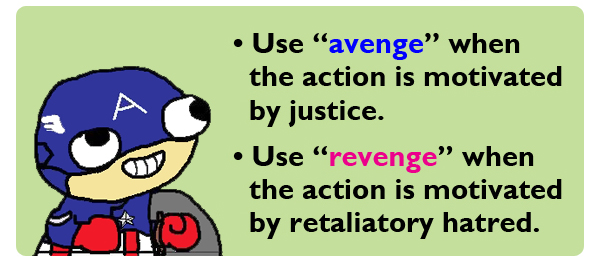Righting Wrongs: Differentiating Revenge and Avenge
Posted on Nov 28, 2018
It can be an empowering emotional experience when we hear or see someone say that they want to avenge their lost loved ones. Inversely, it can be chilling when they speak of taking revenge because they may be heading down a dark path. Avenge and revenge are two powerful words with distinct meanings that can be used to describe important actions and character development, both in and out of literature. However, some people can still confuse the two due to their phonetic similarities—and this mistake significantly alters the message. To right this wrong, we have to know their key differences.

Both avenge and revenge originate from the Latin vindicare, which means “to lay claim to, avenge, or punish.” This is why both words denote actions that are taken in reaction to a certain event. But while they are very similar, they have different contexts and are different parts of speech.
Avenge is exclusively a verb with the following definition: “to take vengeance for or on behalf of” or “to exact satisfaction for (a wrong) by punishing the wrongdoer.” It’s commonly used in the context of pursuing justice or punishing someone for wronging someone other than yourself. For example, a lawyer would seek to avenge their client who was a victim of theft and fraud.

The motivations behind revenge are darker and more personal. From its prefix re-, the word refers to the act of “avenging oneself or another usually by retaliating in kind or degree” or “inflicting injury in return for an insult.” It’s important to note that while revenge can also function as a verb, it is mainly used as a noun, and hence the popular phrase “I’ll have my revenge.” It is far more common to use avenge in its place as a verb. In the event that its verbal form will be used, it still has to refer to taking vengeance for personal reasons.

The most basic difference is that avenge is a verb, whereas revenge is mostly a noun. You would never hear someone say they want to get avenge for their stolen cheese fries; they’d say they want to avenge their fries.
To further illustrate this difference, here are a few examples:
Joni wanted to exact revenge on Amal for that silly putty prank he pulled on him in fifth grade.
Layah’s plan to avenge her family’s death began with learning how to fight.
Revenge was the last thing on the compassionate Aerith’s mind—she offered nothing but forgiveness to those who’ve wronged her.
The victims of the Arizona massacre were finally avenged when the culprit was sentenced to lifetime imprisonment.
Here’s an example of revenge being used as a verb in comparison with avenge:
With her political machinations and years spent deceiving the royal court, Florianne had finally revenged her shameful loss to her once-celebrated cousin, Madeleine.
Oberon wanted to avenge his people’s lost history—starting with reclaiming the artifacts that were taken and displayed as trophies.
To make the two words easier to tell apart, always remember the intentions behind either one. Avenge operates on a desire to attain or achieve justice. Revenge, on the other hand, is always a retaliation or retribution done to satisfy a vendetta.
This should make it easier to tell right from wrong when dealing with avenge and revenge. If you’ve got other questions on grammar and writing, drop a line, and we’ll respond as soon and as best we can. See you!
Sources:
- Revenge - Definition of Revenge by Merriam-Webster
- Avenge - Definition of Avenge by Merriam-Webster
- Avenge vs. Revenge: What's the Difference?
- Avenge vs. Revenge
- Revenge | Origin and meaning of revenge by Online Etymology Dictionary
- Avenge | Origin and meaning of avenge by Online Etymology Dictionary
Disclaimer: Images are not ours. Credit to the owner.
About 1-Hour Proofreading
1-Hour Proofreading is a growing start-up offering fast and efficient editing services at a reasonable price, with the assurance that the document is publication-ready the soonest you need it. Its team of highly competent professional editors is committed to helping those in need of quality editing services while facing tough deadlines.
Visit 1hourproofreading.com for more details.
Follow us:
Back to Grammary



